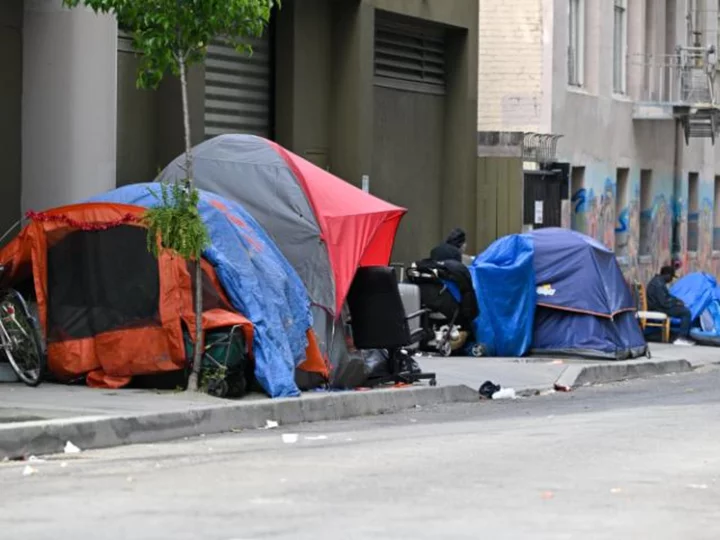The California Highway Patrol may best be known for freeway chases and the Hollywood glamour of its motorcycle cops in television shows like "ChiPs." But now the storied agency is patrolling the streets of San Francisco's Tenderloin as part of a multiagency effort to crack down on rampant drug dealing that's decimating the 50-square-block area.
On one day recently, CNN watched as task force members arrested a suspected drug dealer accused of selling meth and fentanyl. Inside a plastic bag: 33 grams of fentanyl that CHP officer Andy Barclay estimates, at its worst, could potentially kill thousands of people.
"We're looking at around 16,500 fatal doses of pure fentanyl in that small bag. Yes, 16,500 people could potentially die," Barclay said.
A mother was raising her son in a city she loved. Then San Francisco changed and stole her boy
California Governor Gavin Newsom is spearheading the crackdown by adding resources to a problem that isn't unique to San Francisco but has entered the national spotlight as the city's liberal politicians face scrutiny over a perceived rise in crime.
San Francisco Mayor London Breed's office says the CHP has made 100 drug-related arrests since May 30. In the last three months, according to her office, local agencies have arrested 300 suspected drug dealers, and local and state agencies have seized 103 kilos of narcotics, including 56 kilos, or 123 pounds, of fentanyl, the synthetic opioid that is up to 50 times stronger than heroin.
"I'm proud of the CHP and CalGuard's lifesaving efforts to shut down the Tenderloin's poison pipeline and hold drug traffickers accountable," Newsom said a month after shifting some CHP resources from the state's freeways to the city's streets.
The Tenderloin is considered ground zero for San Francisco's open air drug market, which only expanded after Covid-19, forcing Breed to declare a state of emergency in 2021. It's commonplace to see people using and selling drugs. Human waste, used needles and bullet casings litter the sidewalks. All the squalor is a short walk from the city's popular Union Square -- the central shopping district that attracts tourists to its upscale hotels and stores.
It's not just crime: What's really going on with San Francisco's shrinking retail district
Despite the major crackdown, residents and business owners told CNN they don't see the results in their everyday life.
No one CNN spoke with wanted to go on camera for fear of retaliation and harassment, except for Martha Hughes. She's lived in the Tenderloin for 24 years. "I'm not scared of them; I'm not scared of anything," she said. She's seen the deterioration of the area firsthand. "More drug addicts, more drug dealers," she said. "It's just bad."
She supports the police crackdown but doesn't think it's working. Her plan is to leave when she can find a more affordable living situation.
"I'm moving in a couple of years. I had to have surgery this year so I don't have the money, but I'm out of here as soon as I can afford it. I blame this all on the politicians and they don't really seem to care. They have a lot of big talk but there's not enough action really," Hughes said.
New DA, old problems
One of those politicians is San Francisco District Attorney Brooke Jenkins. She was elected in 2022 after voters, fed up with crime, recalled previous district attorney, Chesa Boudin.
"We appear to be failing as city leaders," she told CNN. "I want them to know that I am working every day to ensure that the situation changes. But I'm only one part of this system. I have had to be very vocal about the fact that there is another part of the system right now that is failing them."
Watch: What happened to San Francisco?
Jenkins says her office has filed almost 1,000 drug dealing cases, and she's tried to detain the most serious offenders pending trial.
"Unfortunately, they're cycling back out onto the street almost immediately after the arrest in our case is filed to date," she said, pointing a finger at Superior Court judges.
CNN was unable to independently confirm Jenkins' claims. The San Francisco Superior Court had no comment.
In the last year, Jenkins said her office filed motions to keep 200 of the most egregious drug dealers behind bars while they await trial. Of the 200 motions to detain that were filed, only 17 were granted, according to Jenkins. Judges allowed the rest out on their recognizance. In these cases, the defendant agrees to appear in court when required and to comply with any imposed restrictions or conditions. In some cases, Jenkins said, the suspects did not return for hearing dates or broke the law while released.
"I'm not going to take the blame when my prosecutors are going in and arguing that these people have to remain in custody. The judges are not doing their part and that has to be revealed," Jenkins said.

